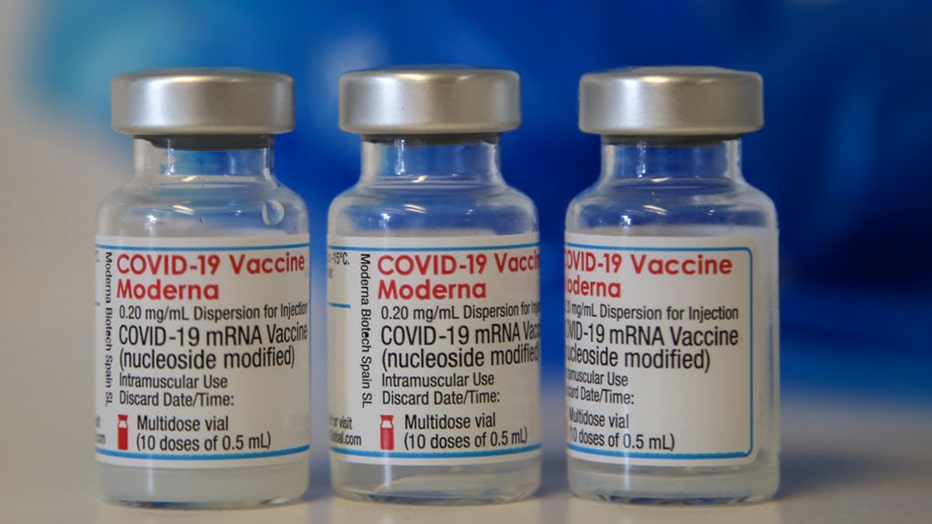Study: Moderna COVID-19 vaccine protects against delta variant up to 6 months
Moderna announced on Aug. 12 a recently published study found their COVID-19 vaccine was 93% effective against the novel coronavirus and its variants, including the highly contagious delta variant, for up to six months, according to a company news release.
The study, published in the journal Science on Aug. 12, noted that antibodies created by Moderna’s COVID-19 vaccine were able to provide continued protection against the virus six months after patients received their second dose.
"We are pleased with these new data showing that people vaccinated with two doses of the Moderna COVID-19 vaccine maintained antibodies through six months, including against variants of concern such as the Delta variant. Along with our partners, we are committed to generating data on the Moderna COVID-19 vaccine and sharing this as available," said Stéphane Bancel, chief executive officer of Moderna.
"These data support the durable efficacy of 93% seen with the Moderna COVID-19 vaccine through six months. We expect that these data and the growing body of real-world evidence will help inform health regulators’ approaches to how and when to administer additional boosting doses," Bancel said.
Data collected in the study found that the vaccine protected against all variants of concern including Alpha, Beta, Gamma, Delta, Epsilon and Iota.

FILE - Vials containing Moderna COVID-19 vaccine.
RELATED: CDC: More than 90% of US counties have ‘substantial or high’ COVID-19 transmission
The U.S. Centers for Disease Control and Prevention categorizes variants of certain diseases dependent upon how contagious they are.
Variants are placed into one of three categories: variants of interest, variants of concern and variants of high consequence.
Variants of concern show evidence that it has high "transmissibility, more severe disease (e.g., increased hospitalizations or deaths), significant reduction in neutralization by antibodies generated during previous infection or vaccination, reduced effectiveness of treatments or vaccines, or diagnostic detection failures," according to the CDC.
The recent study also noted that vaccine-induced antibodies lost some strength over time but they still provided adequate protection from severe COVID-19.
RELATED: COVID-19 booster: CDC panel votes in favor on 3rd shot for immunocompromised after FDA approval
"While some waning in antibody levels was observed over time, the majority of participants had detectable neutralizing antibody titers at six months after the completion of the primary series," according to Moderna.
Researchers also found that lower antibody levels were more prominent in older patients who were part of the study, but the differences between age groups "were small."
"Importantly, many individuals in the oldest group retained neutralizing activity against the variants six months after the second vaccine dose," Moderna said.
Despite the promising data that resulted from the study, authors advised further research needed to continue to determine if a booster dose would be necessary for any potentially more contagious and dangerous variants that could arise.
RELATED: US in ‘much worse situation’ with COVID-19 pandemic than expected, experts say
"While additional studies will be needed to address the impact of new variants that will surely arise in areas of intense viral infection, our data are encouraging for the use of this vaccine in the face of viral variation," the study added.
The recently published study comes on the same day the U.S. Food and Drug Administration authorized the use of a third booster dose of both Moderna’s and Pfizer’s COVID-19 vaccines for people who are immune-compromised.
The late-night announcement Thursday by the FDA applies to several million Americans who are especially vulnerable because of organ transplants, certain cancers or other disorders. Several other countries, including France and Israel, have similar recommendations.
It’s harder for vaccines to rev up an immune system suppressed by certain medications and diseases, so those patients don’t always get the same protection as otherwise healthy people — and small studies suggest for at least some, an extra dose may be the solution.
RELATED: COVID-19 booster vaccine: FDA approves 3rd shot for immunocompromised
"Today’s action allows doctors to boost immunity in certain immunocompromised individuals who need extra protection from COVID-19," Dr. Janet Woodcock, the FDA's acting commissioner, said in a statement.
The FDA determined that transplant recipients and others with a similar level of compromised immunity can receive a third dose of the vaccines from Pfizer and Moderna at least 28 days after getting their second shot. The FDA made no mention of immune-compromised patients who received the single-dose Johnson & Johnson vaccine.
The announcement comes as the extra-contagious delta version of the coronavirus surges through much of the country, pushing new cases, hospitalizations and deaths to heights not seen since last winter.
Importantly, the FDA’s decision only applies to this high-risk group, estimated to be no more than 3% of U.S. adults. It’s not an opening for booster doses for the general population.
The Associated Press contributed to this report.

